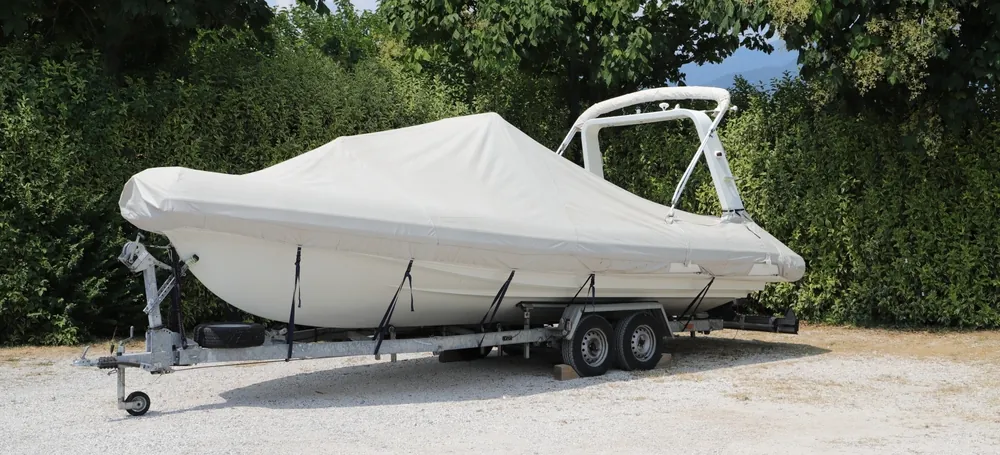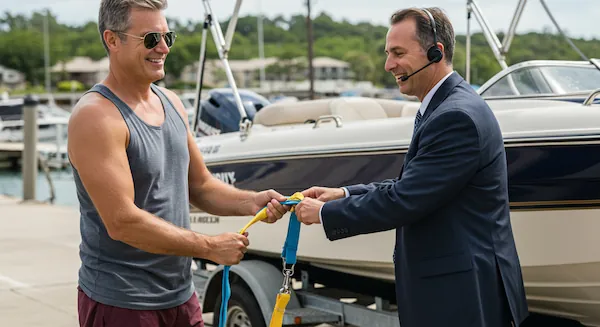
Shipping Boat Trailers
Ship Your Boat Trailers with Confidence
Whether you're hauling across the state or across the country, FreightCenter makes shipping boat trailers smooth, affordable, and stress-free. We connect you with top carriers who specialize in transporting trailers safely and on time. So your shipment is in expert hands from pickup to delivery.
Shipping boat trailers is different from your average freight, and their transportation requires careful planning to reach their destination safely and securely. Explore the various shipping methods, the necessary preparations, and the unique challenges of shipping boat trailers. Regarding shipping boat trailers, some specific considerations and practices must be considered.
Thousands of businesses trust FreightCenter to move their freight faster, smarter, and cheaper! From unbeatable rates to top-notch service, our customers are raving about their shipping success.
See why they keep coming back!
Award-Winning Service, Trusted by Shippers Everywhere!
- 2021, 2017 & 2016 Food Logistics’ Top Green Providers
- 2021 & 2018 Supply & Demand Chain Executives’ Pros to Know: Matthew Brosious
- 2020 & 2019 Top Food Logistics’ 3PL & Cold Storage Provider Award
- 2020 & 2019 Business Observer’s Top 500 Companies on the Gulf Coast
- 2020 & 2017 SmartWay® Transport Partner
- 2020 & 2017 Food Logistics’ Champions: Rock Stars of the Supply Chain
- 2020 Best of Palm Harbor Awards for Local Businesses
- 2017 Green Supply Chain Award from Supply & Demand Chain Executive
- 2017 Tampa Bay Business Journal Heroes at Work
- 2016, 2015, & 2012 Food Logistics Top 100 Software and Technology Providers
- 2013 Tampa Bay Business 100 by Tampa Bay Business Journal
- 2013 Top 100 Great Supply Chain Partners by SupplyChainBrain
- 2012 TIA Samaritan Award Honorable Mention
- 2012, 2011 & 2010 TBBJ Fast 50 Recipient
- 2013, 2011, & 2010 Diversity Business Top Businesses

Why Choose FreightCenter for Shipping Boat Trailers?
We’re not just a broker, we’re your logistics partner. With over 25 years of experience, FreightCenter gives you access to:
-
A national network of specialized flatbed and heavy haul carriers.
-
Real-time tracking and dedicated support.
-
Customized solutions for dealerships, auctions, marinas, and individuals.
-
Assistance with permits, route planning, and documentation for oversized loads.
-
Insurance options for high-value equipment.
Boat Trailer Shipping Methods
- Open Transport: Open transport is the most common and cost-effective method for shipping boat trailers. It involves transporting the trailer on an open carrier, similar to shipping automobiles. While this method is generally reliable, it exposes the trailer to external elements and potential damage from road debris.
- Enclosed Transport: Enclosed transport is an excellent option if you want extra protection for your boat trailer during transit. Enclosed carriers provide a shield from the elements, ensuring that your trailer remains clean and secure throughout the journey. However, this method tends to be more expensive than open transport.
How to Prepare a Boat Trailer for Shipping
- Measurements and Documentation: Before shipping your boat trailer, accurately measure its dimensions, including length, width, and height. This information will determine the appropriate carrier and ensure the trailer fits the required specifications. Additionally, gather all the necessary documentation, such as registration papers, insurance documents, and permits, to comply with legal requirements.
- Proper Securing and Packaging: Properly securing the boat trailer is essential to prevent any damage during transit. Use solid straps and fasteners to secure the trailer to the carrier, ensuring it remains stable throughout the journey. Additionally, inspect the trailer for any loose or protruding parts that need removal or securing.
- Cleaning and Maintenance: Clean the boat trailer thoroughly before shipping to remove any dirt, debris, or corrosive substances that could cause damage during transit. Check for any mechanical issues, such as tire pressure, wheel alignment, and brake functionality, and address them beforehand to ensure a smooth transport process.

Challenges of Shipping Boat Trailers
- Size and Weight: Boat trailers are often large and heavy, making them more challenging to transport than standard freight. Their size can limit the carriers that can accommodate them, and their weight may require special equipment or permits for transportation. Ensuring your chosen carrier can handle your boat trailer’s specific dimensions and weight is important.
- Fragile Components: Boat trailers often contain delicate components, such as lights, winches, and wiring systems. These components are susceptible to damage during transit, particularly when exposed to the elements or rough road conditions. Taking necessary precautions, such as wrapping fragile parts, can help protect them from potential harm.
- Accessibility: Loading and unloading boat trailers can be tricky, especially if there are accessibility challenges at the pickup or delivery locations. Steep driveways, narrow streets, or limited maneuvering space can hinder transportation. Communicate with the shipping company in advance to ensure they have the necessary equipment and expertise to handle any accessibility issues.
- Legal and Regulatory Compliance: Shipping boat trailers often involves complying with specific regulations, permits, and licenses. Depending on the size and weight of the trailer, special permits may be required, and compliance with local, state, and federal regulations is crucial. Familiarize yourself with the legal requirements and work with a reputable shipping provider experienced in handling boat trailers to ensure compliance.
At FreightCenter, we don’t just arrange freight. We engineer customized logistics solutions that match your exact shipping needs. Whether you're moving a single personal-use boat trailer or coordinating a bulk shipment for a dealership, we deliver smart, reliable, and cost-effective services.
Less-Than-Truckload (LTL) shipping is a cost-effective solution for smaller or partially disassembled boat trailers that don't require a full trailer space. By combining multiple shipments onto one truck, you only pay for the portion of space your trailer uses. FreightCenter connects you with trusted carriers who can handle bulky or irregular freight like boat trailers, offering competitive pricing and expert service every step of the way.
Full Truckload (FTL) shipping is ideal for transporting full-size or multiple boat trailers that exceed standard LTL size and weight limits. This service provides exclusive use of a trailer, reducing handling and ensuring direct, secure delivery. FreightCenter offers optimized FTL solutions across dry van, flatbed, and specialized equipment, ensuring your boat trailer shipment arrives safely, efficiently, and on time.
When time is of the essence, expedited shipping gets your boat trailer where it needs to go—fast. Whether you’re facing a tight deadline for a marina delivery, a last-minute sale, or an urgent replacement, FreightCenter offers nationwide expedited trucking services to prioritize your shipment. Our logistics experts match you with the fastest, most reliable carriers to minimize downtime and keep your operations moving.
Some boat trailers require more than standard freight services—they demand specialized handling. Whether you're shipping an oversized trailer, a high-value custom unit, or one that requires temperature protection or extra care, FreightCenter offers access to top carriers with the equipment and expertise to get the job done right. From white glove pickup to international delivery, we tailor the entire shipping process to suit your boat trailer’s exact needs.


Boat Trailer Shipping Backed by Expertise and Trust
With decades of experience moving oversized and specialized equipment, FreightCenter has built a nationwide carrier network specifically suited for transporting boat trailers of all shapes and sizes. From bunk trailers to tandem-axle setups, we coordinate every detail, routing, permits, accessorials, and protective handling, to ensure your trailer arrives ready to roll.
And because we’re more than just a broker, our freight experts become an extension of your team. Need help planning recurring shipments? Want to bundle accessories or boat hardware? We’ve got you covered with competitive pricing, live support, and even a rewards program for ltl customers.
Ready to ship your trailer? Our expert agents are here to help you find the best shipping solution for your needs. Get a free freight quote using our online tool, or call us at (800) 716-7608 today!
Frequently Asked Questions about Shipping Boat Trailers

Q. Can I ship a boat trailer without the boat on it?
Yes, boat trailers can be shipped separately from the boat. Whether empty or loaded with accessories, FreightCenter helps arrange the right freight solution to transport the trailer safely and affordably.
Q. What is the best freight method for shipping a boat trailer?
It depends on the size and urgency. Smaller trailers may qualify for LTL shipping, while larger or full-length trailers typically require flatbed or full truckload (FTL) service. FreightCenter matches your shipment to the best-fit carrier and method.
Q. Do I need to disassemble the boat trailer before shipping?
Not usually, though it can help reduce shipping costs. If the trailer’s dimensions exceed standard freight limits, disassembling parts like the tongue or wheels may make it easier and more affordable to ship.
Q. How do I prepare my boat trailer for shipping?
Remove any loose or detachable parts, secure all moving components, and clean the trailer thoroughly. If applicable, deflate tires slightly to reduce bounce.
Q. How much does it cost to ship a boat trailer?
Cost varies by distance, dimensions, weight, shipping method, and service level. FreightCenter offers instant quotes from top carriers, helping you compare rates and select the most cost-effective option.
Q. Can I ship a trailer with personal items or equipment on it?
It’s not recommended, as personal items may not be covered by insurance and could shift or get damaged during transit. FreightCenter advises removing all unsecured cargo before shipping.
Q. Is insurance included when I ship a boat trailer?
Basic carrier liability coverage is typically included, but additional freight insurance is recommended for high-value trailers. FreightCenter can help you add supplemental insurance for peace of mind.
Q. Are permits required for oversized boat trailers?
Yes, if your trailer exceeds legal size limits, oversize load permits may be required. FreightCenter works with carriers who handle permitting and routing to ensure compliance with state and federal regulations.
Q. Can I ship a tandem or multi-axle boat trailer?
Q. How long does it take to ship a boat trailer?
Yes. FreightCenter provides shipment tracking so you always know where your trailer is during transit. You’ll receive updates and can contact our support team for personalized assistance.
Q. What are the size limits for boat trailer shipping?
Each carrier has different size limits, but trailers longer than 12 feet or wider than 8.5 feet may require special equipment. FreightCenter helps determine the right freight mode for your trailer’s dimensions.
Q. Is it possible to ship a boat trailer internationally?
Yes, international shipping is available for boat trailers. FreightCenter can assist with ocean freight options, customs documentation, and international compliance requirements.
Q. Why should I use FreightCenter to ship my boat trailer?
FreightCenter offers access to top-rated carriers, competitive pricing, expert support, and full-service logistics tailored to your boat trailer’s unique needs. From quote to delivery, we make the process smooth and stress-free.

Use Wheel Chocks and Strap Points to Prevent Load Shifting
Many shippers overlook the importance of properly securing a boat trailer on the pallet or trailer bed. Use high-strength ratchet straps and add wheel chocks or blocks to immobilize the tires. Not only does this reduce damage risk, but some carriers may offer lower rates or waive accessorial charges when they see the trailer is already stabilized and ready for safe loading.

Time Your Shipment to Avoid Seasonal Surcharges
Boat trailers are often shipped before or after peak boating seasons (spring and fall), which is also when demand for specialized freight services surges. If your schedule allows, consider shipping during off-peak months—like late summer or mid-winter—to avoid inflated rates and limited carrier availability. FreightCenter can help you compare flexible pickup windows to maximize savings.

Ask for “No-Tarp” Discount Options on Flatbed Loads
If your trailer is weather-resistant and doesn't require tarping, you may be eligible for discounted flatbed rates. Many carriers charge extra for tarping due to labor and time, so waiving that requirement (if safe and appropriate) can lead to immediate cost reductions. Just make sure your trailer is built to withstand exposure, or prep it with protective coverings on key components.

